MercoPress. South Atlantic News Agency
Tag: police strike
-
Saturday, December 14th 2013 - 06:04 UTC
Argentina: compensation to security forces that helped contain police protests and looting
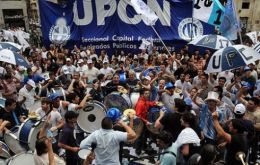
Cabinet Chief Jorge Capitanich confirmed on Friday that President Cristina Fernández will announce next week an “economic and financial recognition” to the members of national security forces following the deployment of 12,000 agents across the country to counter the impacts of the police protests and lootings that hit almost all Argentine provinces over the past days.
-
Friday, December 13th 2013 - 08:47 UTC
Keeping up with inflation in Argentina: after calming police, who's next in the queue

Police protests and widespread looting in 19 of the 24 Argentine provinces has, in a few weeks, shattered expectations about the new cabinet of President Cristina Fernandez and a stabilization of the economy, since as can be anticipated government employees and unions will be demanding similar conditions as their blue uniformed colleagues to keep up to date with inflation, running at an annualized 26% according to the November reading.
-
Saturday, December 7th 2013 - 22:07 UTC
Police unrest in Argentina continues to extend; Buenos Aires says it is prepared

The Argentine police unrest in demand for higher wages which started last Monday in Cordoba has rapidly spread to at least eight other provinces and the central government in Buenos Aires is preparing for a major challenge. It has already sent special gendarmerie forces to Santa Fe and Cordoba, on request from the governors.
-
Wednesday, December 4th 2013 - 23:04 UTC
Cordoba police wage strike over; conflict revealed ongoing clash of Governor with Buenos Aires

The governor of the Argentine province of Córdoba José Manuel De La Sota confirmed on Wednesday a wage deal was reached to end a conflict and protest staged by the police force on Tuesday which coincided with a wave of looting and left two people dead.
-
Wednesday, December 4th 2013 - 05:48 UTC
Looting spreads in Argentina's third largest city as police go on strike

Looting and robbing spread to several areas of the Argentine city of Cordoba on Tuesday evening and night following a walkout from the police in the midst of a conflict over pay and other benefits.
-
Wednesday, August 8th 2012 - 18:36 UTC
Brazilian Federal Police on strike; delays at airports and border crossings
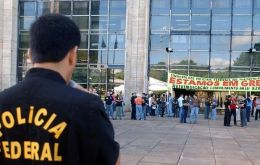
The strike declared by the Brazilian Federal Police on Tuesday is beginning to cause difficulties at international airports, delaying the crossing of visitors to neighbouring countries and some organized pickets have been marching in front of federal government offices.
-
Wednesday, July 18th 2012 - 07:52 UTC
Buenos Aires sends forces to Santa Cruz province to help with law and order
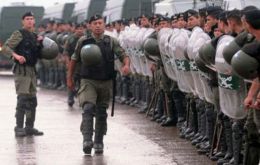
Argentine President Cristina Fernandez political turf, the Patagonian province of Santa Cruz has formally requested the deployment of federal forces to help keep law and order because of a 16-day strike by the provincial police.
-
Saturday, February 11th 2012 - 08:00 UTC
Brazil readies 14.000 troops in case Rio do Janeiro police strike extends
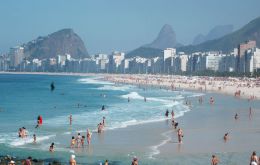
Brazil prepared to deploy troops on the streets of Rio de Janeiro on Friday, as a strike by the state's police force threatened to disrupt upcoming carnival festivities and raised new questions about security before the 2014 World Cup.
-
Friday, February 10th 2012 - 03:58 UTC
Police strike shows security remains main challenge for Brazil’s world events

Hundreds of striking police officers ended their 10-day occupation of a state assembly house in Brazil's third-biggest city, easing tensions in a walkout that unleashed a bloody crime wave and threatened upcoming carnival celebrations.
-
Monday, February 6th 2012 - 06:40 UTC
Brazil sends elite force to quash police strikers entrenched in city of Salvador
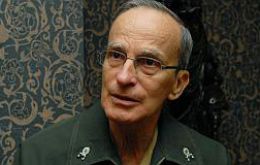
Troops locked down the northeast Brazilian city of Salvador on Sunday as an elite unit prepared to besiege the legislature and arrest armed police officers whose strike action has sent homicides spiralling.
